Membership Spotlight: Kenneth Carano
Membership Spotlight: Kenneth Carano
- TSSP Newsletter
- Membership Spotlight: Kenneth Carano
Interested in highlighting your work? E-mail tssp@ncss.org!
1. Thank you for agreeing to this interview! Could you tell us about yourself?
I am a professor in the division of education & leadership at Western Oregon University, where I have been since 2011. I am also the executive editor of the Oregon Journal of the Social Studies and programs coordinator at the Center for Geography Education in Oregon. Previously, I taught high school social studies for 9 years and am a returned Peace Corps volunteer, having lived with my wife in Surname, South America with descendants of runaway enslaved peoples in the Amazon rainforest basin. Additionally, I have co-authored a middle school pedagogy book, along with publishing over 50 articles and book chapters. I would describe my scholarship as ever evolving into the dismantling of my own settler colonialist framework that has permeated my upbringing in a society in which this framework is subconsciously so prominent.
2. Could you tell us about your time and involvement with NCSS?
I have been a member of NCSS since 2005, which was the same year I attended my first NCSS conference in Kansas City. Since then, I have not missed an NCSS conference and am looking forward to finally being back in person at NCSS in Philadelphia this coming December. Further, my involvement within NCSS has included being a representative for CUFA for four years on the NCSS House of Delegates and I frequently present at the NCSS conferences. In fact, I’ll take a moment to plug my presentation at the upcoming NCSS conference in Philadelphia. I’ll be co-presenting with my colleague Lin Wu on Reimagining the COVID-19 Pandemic as a Portal to Justice for Asian American Students. Finally, I am excited to be working with NCSS on chapters for a couple of upcoming books on teaching with primary sources.
3. Could you tell us about your upcoming institute on the Civil Rights Trail?
Thanks to grant funding from The Gray Family Foundation and the Teaching with Primary Source Western Region, along with local partnerships (Oregon Historical Society, Classroom Law Project, the Oregon Jewish Museum & Center for Holocaust Education in Oregon, and the Oregon Department of Education), as programs coordinator of the Center for Geography Education in Oregon, I am leading a year and a half institute that includes a series of workshops for Oregon K-12 teachers on analyzing Black histories and geographies through primary sources. The first two workshops took place in Oregon.
The initial workshop, Black Histories and Geographies in Oregon, on November 13, 2021, was attended by approximately 40 teachers in Portland, Oregon. The workshop included presentations from prominent local Black scholars, working with analyzing historical document at the Oregon Historical Society, and a field trip to Albina, Portland’s historical African American neighborhood. Participants spent time there analyzing historical images in order to get a better understanding of the impact redlining, the freeway system, and gentrification have had on the local community in the Albina district. Our second workshop took place in the coastal town of Coos Bay. The location of Oregon’s only documented lynching of an African American.
Our upcoming workshop, which runs this summer, from June 22-27, will take 14 Oregon teachers along the Civil Rights Trail in Alabama and Atlanta. The itinerary will begin in Birmingham, Alabama, and continues to Selma and Montgomery, Alabama before ending in Atlanta, Georgia. Some of the highlights along the tour that participants will experience include attending the Civil Rights Institute, 16th Street Baptist Church, and attending afternoon sessions at the University of Alabama Birmingham on pedagogical ideas for teaching the Civil Rights Movement in which teachers from Oregon, Alabama, and Louisiana will come together to learn and share classroom ideas. These sessions will be led by Dr. Jeremiah Clabough, and presenters include, among others, long-time NCSS members and contributors Dr. Caroline Sheffield, and Dr. Natalie Keefer. In Selma, participants will be guided by Dianne Harris, a foot soldier of the Civil Rights Movement, who saw the horrors of Bloody Sunday in Selma firsthand. There, visits include walking across the Edmund Pettus Bridge, and visiting the Voting Rights Museum, and Brown Chapel Church. In Montgomery, highlights include attending the Rosa Parks Museum, The Legacy Museum, and The National Memorial for Peace and Justice. The tour will finish up in Atlanta, where attendees will go explore sites, such as the Civil & Human Rights Museum, Ebenezer Baptist Church, and Dr. King’s home.
4. Where did the inspiration for this institute come from?
In Oregon, we are fortunate to have legislators and state leaders, who have chosen to resist the ideological choice of defaulting to teaching social studies through white perspectives. Instead, Oregon has legislatively mandated ethnic studies standards be taught in K-12 classrooms. As a result, working with the Oregon Department of Education’s social science specialist, Amit Kobrowski and through grants from the Gray Family Foundation and the Teaching with Primary Sources Western Region, I have been able to facilitate an institute that focuses on decentering master narratives, and my own voice as the white instructor, in order to be an ally by attempting to step out of the way in order that oppressed voices have the power to have their stories become centered and a critical part of the narrative. Ways this institute is attempting to do this include using African American-created primary sources and employing LaGarrett King’s Black Historical Consciousness to encourage our institute K-12 teacher participants to teach through people’s stories rather teaching than about topics.
5. How can we register or attend this institute?
While the institute is for Oregon teachers, we are creating a website in order that educators anywhere can follow the progress by seeing updates of trip highlights, including educator resources, videos, and images. In the meantime, as the site is under construction, readers can follow the Center for Geography Education in Oregon Facebook page to get updates. The Facebook site will also publish the website when it is up and running. People can also access the Center for Geography Education in Oregon’s YouTube channel for updated videos taken during Institute workshops. Currently, they can view Taylor Stewart’s talk, the Coos Bay workshop keynote speaker. In the workshop’s video, he discusses his work establishing a memorial for Alonzo Tucker, who was lynched in the Coos Bay area and his current work on working with city officials in former sundown towns to establish historical markers and truth and reconciliation in those areas. Additionally, readers can get updates by emailing me at caranok@wou.edu.
6. Will any resources be made available for those interested but unable to attend?
For those unable to attend any of the workshops, both within Oregon and elsewhere, the teacher participants will be authoring a peer reviewed open source e-book. Utilizing LaGarrett King’s Black Historical Consciousness, the e-book will focus on providing inquiry-based lessons that focus on teaching through Black histories and geographies rather than about Black histories and geographies. Additionally, ethnic studies inquiry-based lessons and activities will be created during additional institute workshops starting this upcoming fall. For further details, feel free to reach out to me at caranok@wou.edu.
Below are some images from earlier workshops in the institute.
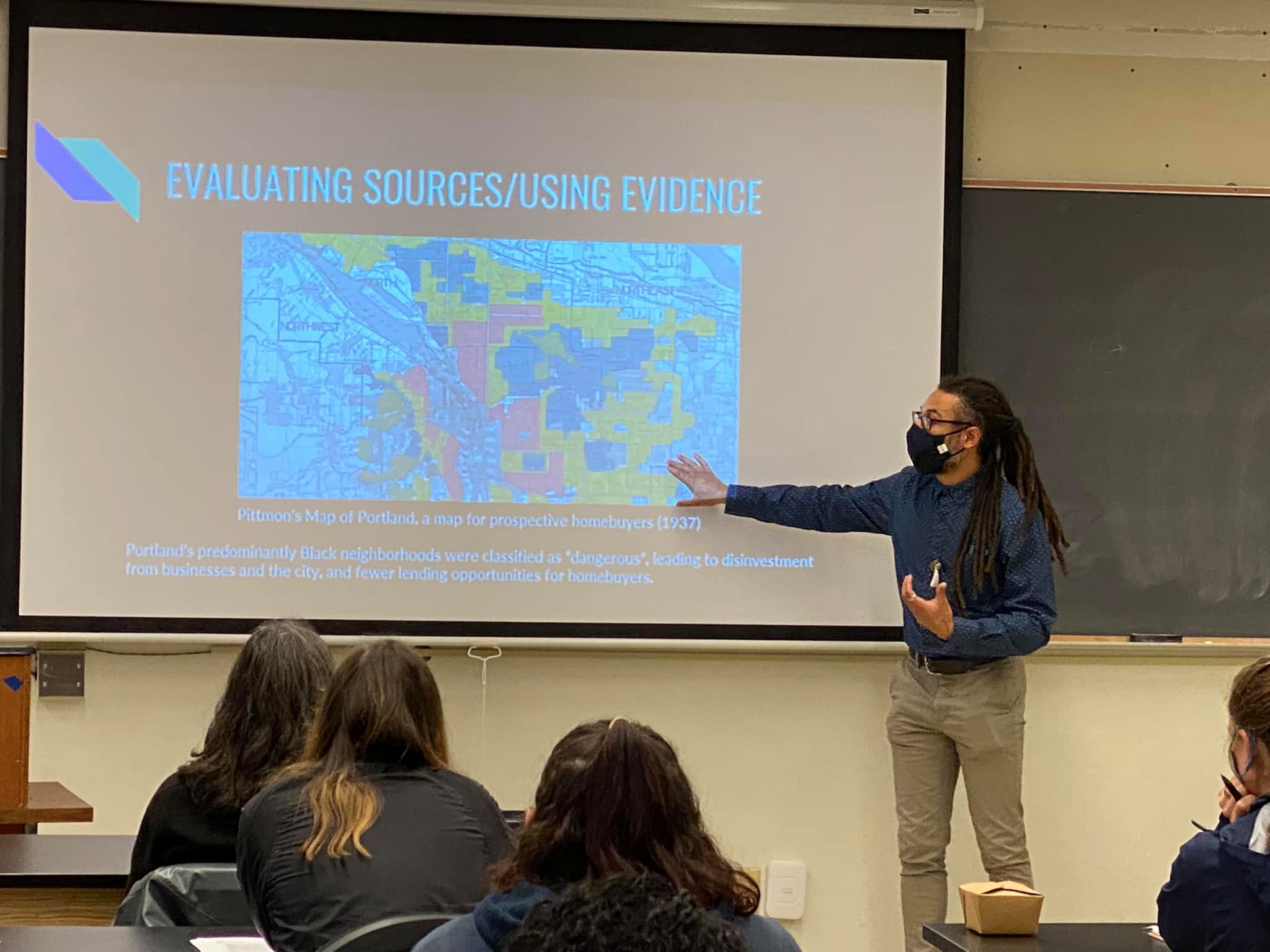
Zachary Stocks, the executive director of Oregon Black Pioneers, shares a presentation on using primary sources to teach historical implications of inequitable systems
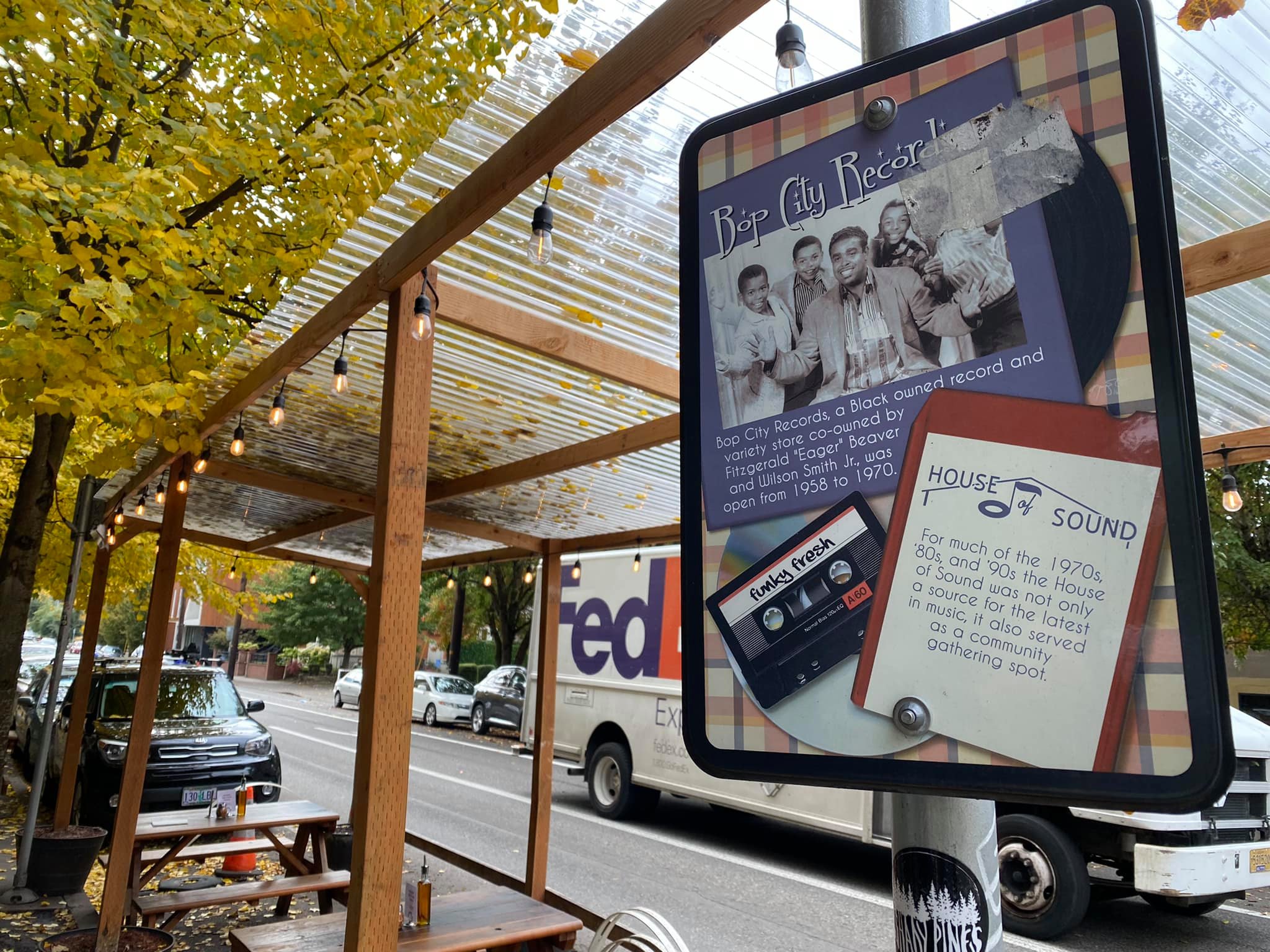
One of the historical markers on the field trip in what was once known as the Albina district and has now become a high priced area due to gentrification.
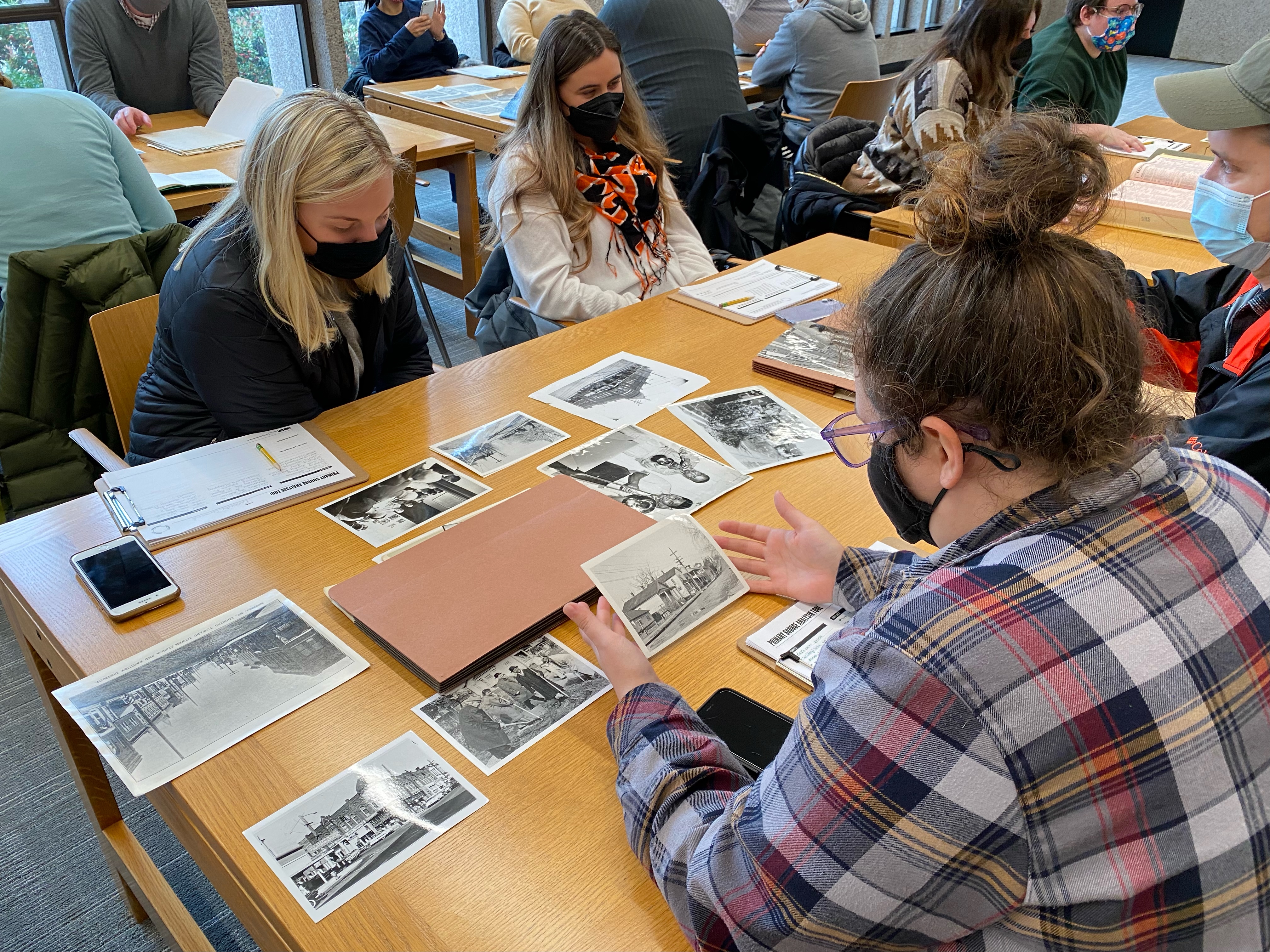
Participants of the Portland workshop analyzing historical images of the Albina district while at the Oregon Historical Society.
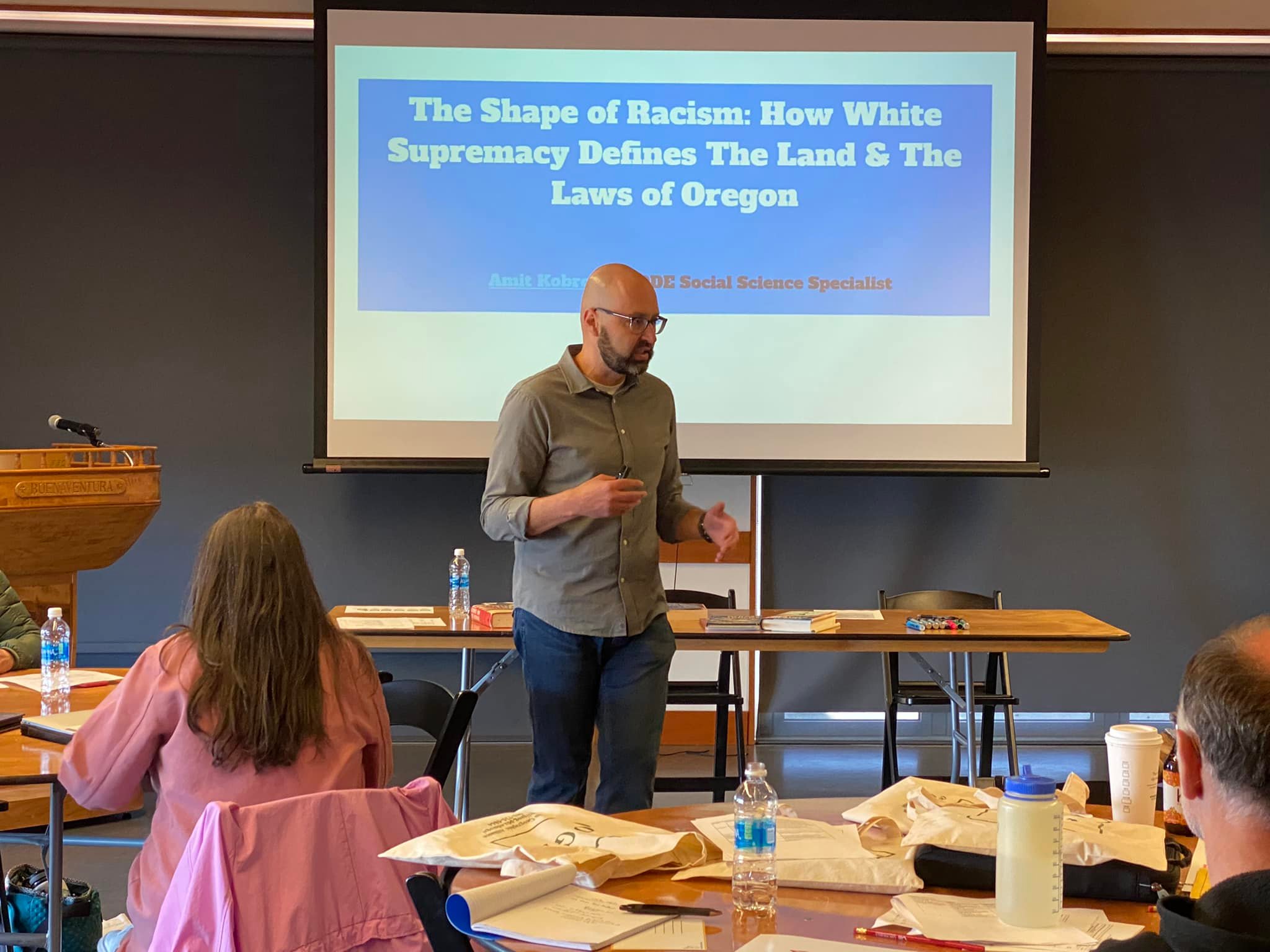
Amit Kobrowski, from the Oregon Department of Education, presenting at the Coos Bay workshop.
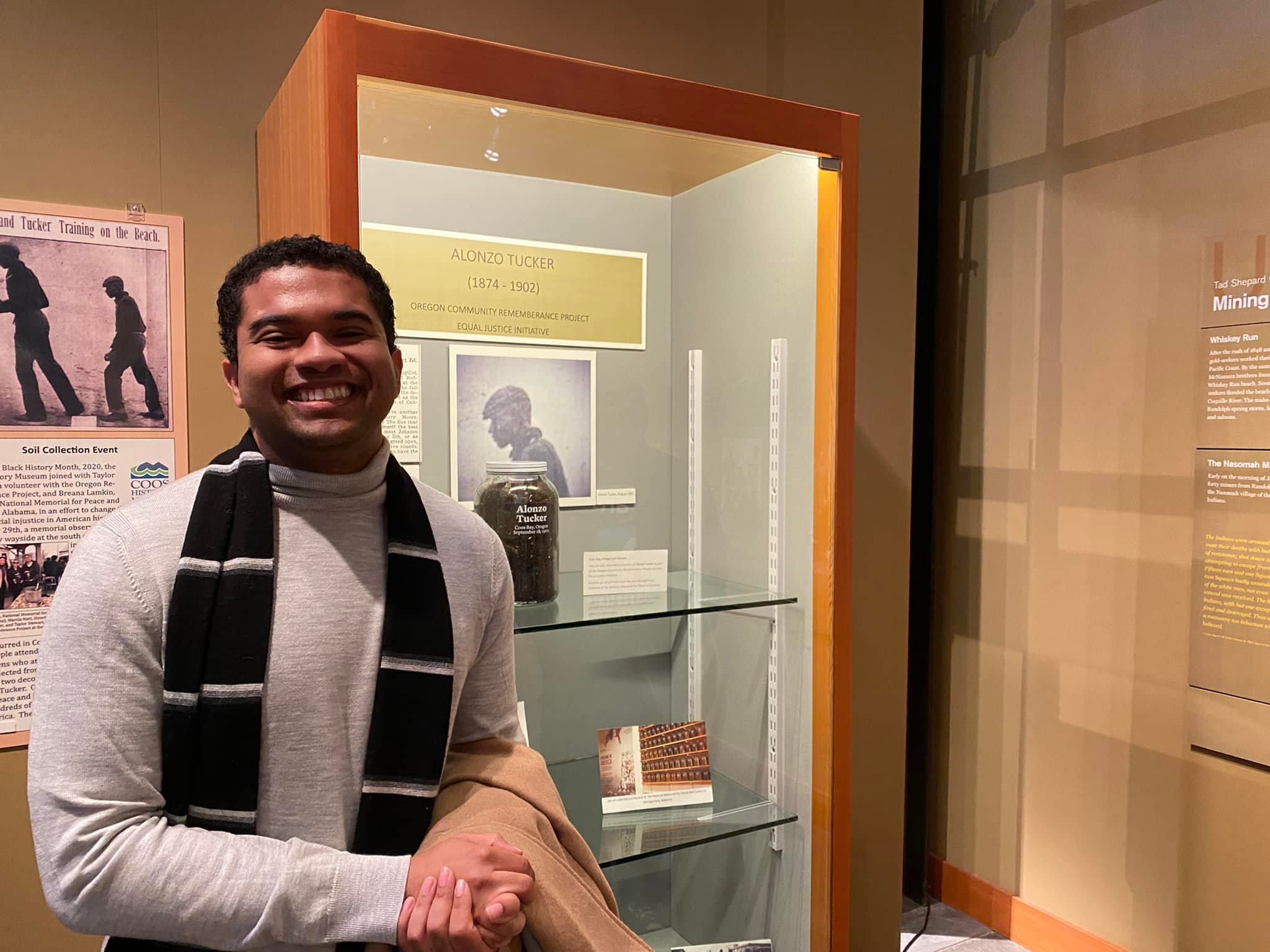
Taylor Stewart, the Coos Bay workshop keynote speaker, who led the work to establish a memorial for the African American lynched in what is now the town of Coos Bay.
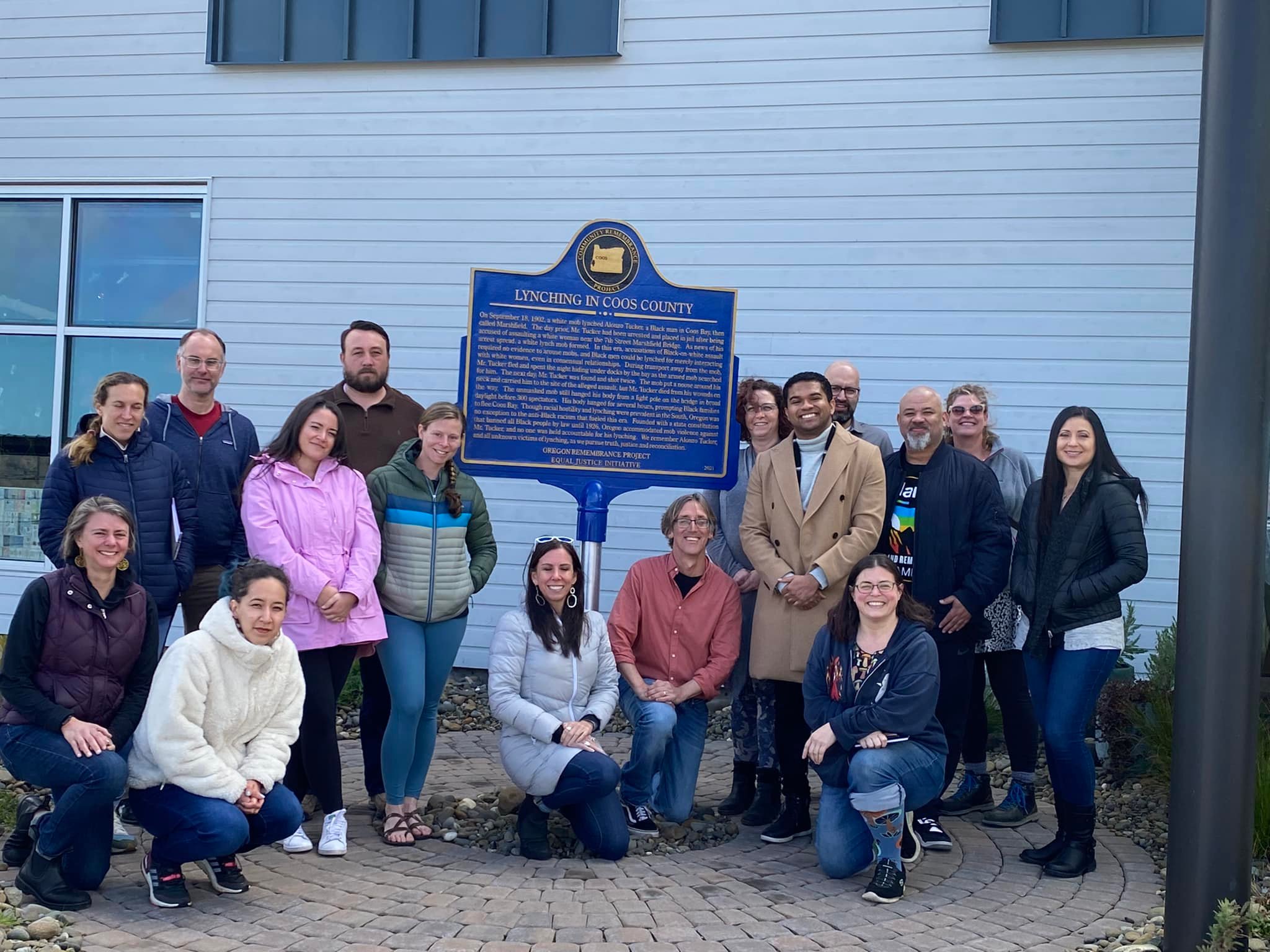
Coos Bay workshop participants posing outside of Coos Museum, where the memorial for Alonzo Tucker is located.
